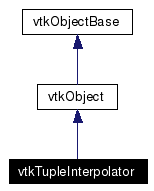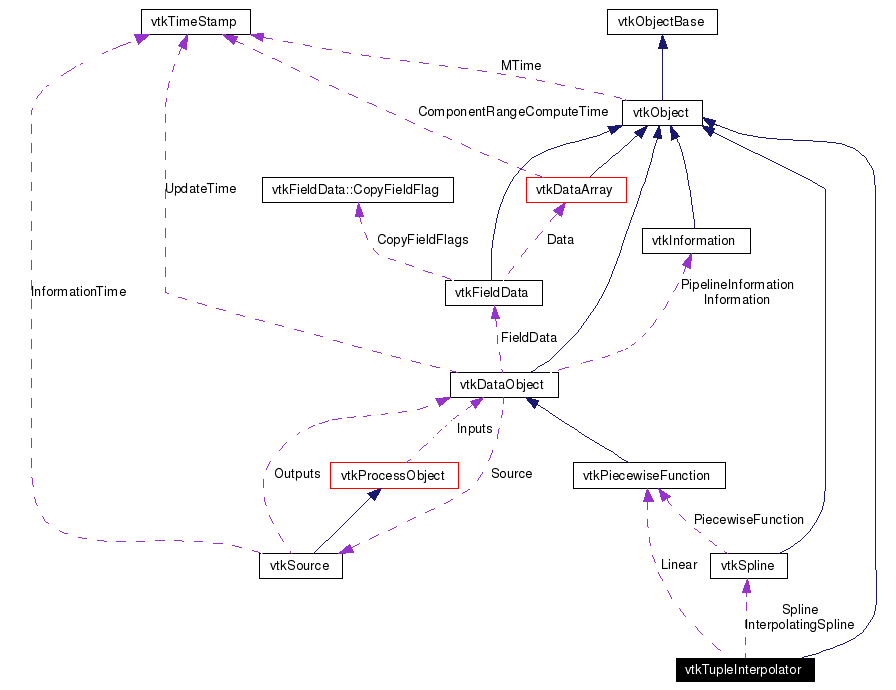vtkTupleInterpolator Class Reference
#include <vtkTupleInterpolator.h>
Inheritance diagram for vtkTupleInterpolator:
 [legend]Collaboration diagram for vtkTupleInterpolator:
[legend]Collaboration diagram for vtkTupleInterpolator: [legend]List of all members.
[legend]List of all members.
Detailed Description
interpolate a tuple of arbitray size
This class is used to interpolate a tuple which may have an arbitrary number of components (but at least one component). The interpolation may be linear in form, or via a subclasses of vtkSpline.
To use this class, begin by specifying the number of components of the tuple and the interpolation function to use. Then specify at least one pair of (t,tuple) with the AddTuple() method. Next interpolate the tuples with the InterpolateTuple(t,tuple) method, where "t" must be in the range of (t_min,t_max) parameter values specified by the AddTuple() method (if not then t is clamped), and tuple[] is filled in by the method (make sure that tuple [] is long enough to hold the interpolated data).
You can control the type of interpolation to use. By default, the interpolation is based on a Kochanek spline. However, other types of splines can be specified. You can also set the interpolation method to linear, in which case the specified spline has no effect on the interpolation.
- Warning:
- Setting the number of components or changing the type of interpolation causes the list of tuples to be reset, so any data inserted up to that point is lost. Bisection methods are used to speed up the search for the interpolation interval.
Definition at line 52 of file vtkTupleInterpolator.h.
Member Typedef Documentation
Member Enumeration Documentation
|
|
Enums to control the type of interpolation to use. - Enumerator:
-
| INTERPOLATION_TYPE_LINEAR |
|
| INTERPOLATION_TYPE_SPLINE |
|
Definition at line 102 of file vtkTupleInterpolator.h. |
Constructor & Destructor Documentation
| vtkTupleInterpolator::vtkTupleInterpolator |
( |
|
) |
[protected] |
|
| virtual vtkTupleInterpolator::~vtkTupleInterpolator |
( |
|
) |
[protected, virtual] |
|
Member Function Documentation
| virtual const char* vtkTupleInterpolator::GetClassName |
( |
|
) |
[virtual] |
|
| static int vtkTupleInterpolator::IsTypeOf |
( |
const char * |
type |
) |
[static] |
|
|
|
Return 1 if this class type is the same type of (or a subclass of) the named class. Returns 0 otherwise. This method works in combination with vtkTypeRevisionMacro found in vtkSetGet.h.
Reimplemented from vtkObject. |
| virtual int vtkTupleInterpolator::IsA |
( |
const char * |
type |
) |
[virtual] |
|
|
|
Return 1 if this class is the same type of (or a subclass of) the named class. Returns 0 otherwise. This method works in combination with vtkTypeRevisionMacro found in vtkSetGet.h.
Reimplemented from vtkObject. |
| void vtkTupleInterpolator::PrintSelf |
( |
ostream & |
os, |
|
|
vtkIndent |
indent |
|
) |
[virtual] |
|
|
|
Methods invoked by print to print information about the object including superclasses. Typically not called by the user (use Print() instead) but used in the hierarchical print process to combine the output of several classes.
Reimplemented from vtkObject. |
|
|
Instantiate the class.
Reimplemented from vtkObject. |
| void vtkTupleInterpolator::SetNumberOfComponents |
( |
int |
numComp |
) |
|
|
|
|
Specify the number of tuple components to interpolate. Note that setting this value discards any previously inserted data. |
| virtual int vtkTupleInterpolator::GetNumberOfComponents |
( |
|
) |
[virtual] |
|
|
|
Specify the number of tuple components to interpolate. Note that setting this value discards any previously inserted data. |
| int vtkTupleInterpolator::GetNumberOfTuples |
( |
|
) |
|
|
|
|
Return the number of tuples in the list of tuples to be interpolated. |
| double vtkTupleInterpolator::GetMinimumT |
( |
|
) |
|
|
|
|
Obtain some information about the interpolation range. The numbers returned (corresponding to parameter t, usually thought of as time) are undefined if the list of transforms is empty. This is a convenience method for interpolation. |
| double vtkTupleInterpolator::GetMaximumT |
( |
|
) |
|
|
|
|
Return the number of tuples in the list of tuples to be interpolated. |
| void vtkTupleInterpolator::Initialize |
( |
|
) |
|
|
|
|
Reset the class so that it contains no (t,tuple) information. |
| void vtkTupleInterpolator::AddTuple |
( |
double |
t, |
|
|
double |
tuple[] |
|
) |
|
|
|
|
Add another tuple to the list of tuples to be interpolated. Note that using the same time t value more than once replaces the previous tuple value at t. At least two tuples must be added to define an interpolation function. |
| void vtkTupleInterpolator::RemoveTuple |
( |
double |
t |
) |
|
|
|
|
Delete the tuple at a particular parameter t. If there is no tuple defined at t, then the method does nothing. |
| void vtkTupleInterpolator::InterpolateTuple |
( |
double |
t, |
|
|
double |
tuple[] |
|
) |
|
|
|
|
Interpolate the list of tuples and determine a new tuple (i.e., fill in the tuple provided). If t is outside the range of (min,max) values, then t is clamped. Note that each component of tuple[] is interpolated independently. |
| void vtkTupleInterpolator::SetInterpolationType |
( |
int |
type |
) |
|
|
|
|
Specify which type of function to use for interpolation. By default spline interpolation (SetInterpolationFunctionToSpline()) is used (i.e., a Kochanek spline) and the InterpolatingSpline instance variable is used to birth the actual interpolation splines via a combination of NewInstance() and DeepCopy(). You may also choose to use linear interpolation by invoking SetInterpolationFunctionToLinear(). Note that changing the type of interpolation causes previously inserted data to be discarded. |
| virtual int vtkTupleInterpolator::GetInterpolationType |
( |
|
) |
[virtual] |
|
|
|
Specify which type of function to use for interpolation. By default spline interpolation (SetInterpolationFunctionToSpline()) is used (i.e., a Kochanek spline) and the InterpolatingSpline instance variable is used to birth the actual interpolation splines via a combination of NewInstance() and DeepCopy(). You may also choose to use linear interpolation by invoking SetInterpolationFunctionToLinear(). Note that changing the type of interpolation causes previously inserted data to be discarded. |
| void vtkTupleInterpolator::SetInterpolationTypeToLinear |
( |
|
) |
[inline] |
|
|
|
Specify which type of function to use for interpolation. By default spline interpolation (SetInterpolationFunctionToSpline()) is used (i.e., a Kochanek spline) and the InterpolatingSpline instance variable is used to birth the actual interpolation splines via a combination of NewInstance() and DeepCopy(). You may also choose to use linear interpolation by invoking SetInterpolationFunctionToLinear(). Note that changing the type of interpolation causes previously inserted data to be discarded.
Definition at line 119 of file vtkTupleInterpolator.h. |
| void vtkTupleInterpolator::SetInterpolationTypeToSpline |
( |
|
) |
[inline] |
|
|
|
Specify which type of function to use for interpolation. By default spline interpolation (SetInterpolationFunctionToSpline()) is used (i.e., a Kochanek spline) and the InterpolatingSpline instance variable is used to birth the actual interpolation splines via a combination of NewInstance() and DeepCopy(). You may also choose to use linear interpolation by invoking SetInterpolationFunctionToLinear(). Note that changing the type of interpolation causes previously inserted data to be discarded.
Definition at line 121 of file vtkTupleInterpolator.h. |
| void vtkTupleInterpolator::SetInterpolatingSpline |
( |
vtkSpline * |
|
) |
|
|
|
|
If the InterpolationType is set to spline, then this method applies. By default Kochanek interpolation is used, but you can specify any instance of vtkSpline to use. Note that the actual interpolating splines are created by invoking NewInstance() followed by DeepCopy() on the interpolating spline specified here, for each tuple component to interpolate. |
| virtual vtkSpline* vtkTupleInterpolator::GetInterpolatingSpline |
( |
|
) |
[virtual] |
|
|
|
If the InterpolationType is set to spline, then this method applies. By default Kochanek interpolation is used, but you can specify any instance of vtkSpline to use. Note that the actual interpolating splines are created by invoking NewInstance() followed by DeepCopy() on the interpolating spline specified here, for each tuple component to interpolate. |
| void vtkTupleInterpolator::InitializeInterpolation |
( |
|
) |
[protected] |
|
Member Data Documentation
The documentation for this class was generated from the following file:
Generated on Tue Jan 22 00:25:28 2008 for VTK by
 1.4.3-20050530
1.4.3-20050530



 1.4.3-20050530
1.4.3-20050530